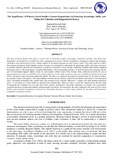The Significance of Primary Social Studies Content Organization in Fostering Knowledge, Skills, and Values for Cohesion and Integration in Kenya
Date
2023-11-09Author
Ruto, Zipporah Jerotich
Shiundu, John O.
Simiyu, Aggrey M.
Metadata
Show full item recordAbstract
The field of Social Studies (SS) plays a crucial role in nurturing students' knowledge, intellectual abilities, and democratic disposition, all of which are essential for active engagement in society. The SS curriculum is designed to address the demands, challenges, and aspirations of society, aiding students in developing appropriate and virtuous values. This study aimed to explore the structure of primary Social Studies content and assess its potential for cultivating the knowledge, skills, and values necessary to promote national cohesion and integration. It adopted a descriptive survey design, employing stratified and random sampling methods to select 1,195 participants, including 940 students, 188 social studies teachers, 47 head teachers from primary schools, and 12 Curriculum Support Officers from six sub-counties within Uasin Gishu County. Data collection involved the use of questionnaires for teachers and CSOs, observation guides for social studies teachers, interview schedules for head teachers and CSOs, and focus group discussion guides for pupils. The data was analyzed descriptively and presented in the form of tables, percentages, means, and figures. The study findings revealed that the primary school Social Studies curriculum is well-structured with a systematic breakdown into smaller units that promote social cohesion. Moreover, it aligns with eight national education goals, six of which are closely linked to interpersonal relationships. However, there is room for improvement, and the study recommends the inclusion of areas that have been omitted, particularly citizenship education, to enhance the curriculum's comprehensiveness in educating students about peaceful coexistence. In conclusion, the study emphasizes the necessity for a more holistic approach that encompasses all facets of citizenship education to better equip students for peaceful and harmonious coexistence in a diverse society.
URI
https://doi.org/10.51867/ajernet.4.2.92https://ajernet.net/ojs/index.php/ajernet/article/view/200
http://ir-library.mmust.ac.ke:8080/xmlui/handle/123456789/2394
Collections
- Gold Collection [969]

